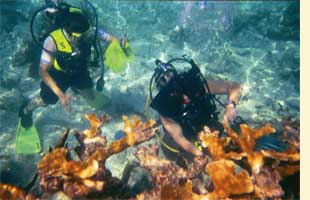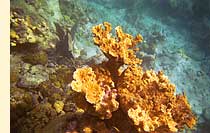Sewage-Contaminated Water Reaching Florida’s Offshore Keys
A new University of Georgia study has determined that sewage is impinging on the offshore reefs of the Upper Florida Keys, possibly threatening corals and human health. The widespread use of cesspits, septic tanks, and injection wells appears to be the source of the problem, according to study director Erin Lipp, an assistant professor of environmental health sciences at UGA’s College of Public Health.
 Lipp and doctoral student Carrie Futch, along with Dale Griffin of the U.S. Geological Survey in Tallahassee, sampled surface water, groundwater, and corals from five nearshore and offshore sites. Their three-year study, funded by the U.S. Environmental Protection Agency (EPA), has revealed common fecal-indicator bacteria and human viruses.
Lipp and doctoral student Carrie Futch, along with Dale Griffin of the U.S. Geological Survey in Tallahassee, sampled surface water, groundwater, and corals from five nearshore and offshore sites. Their three-year study, funded by the U.S. Environmental Protection Agency (EPA), has revealed common fecal-indicator bacteria and human viruses.
The fecal-indicator bacteria, which are not pathogens themselves but rather serve as surrogates for disease-causing microbes found in sewage, declined with distance from shore but tended to be elevated in coral secretions. High levels of fecal-indicator bacteria from canals were also shown to move into the nearshore environment on outgoing tides. And genetic material from enteric viruses, which are only found in human feces and urine, were common throughout the sampled area, including locations more than six miles offshore.
Lipp is not sounding an alarm, however. “Until we actually know the level of risk, there is no need for people to change their behavior,” she said, “but our findings do show that centralized sewage treatment of water is needed.”
 Bill Kruczynski, Florida Keys program scientist for the EPA, agreed that the installation of new wastewater-management systems—as recommended by the Water Quality Protection Program (WQPP) for the Florida Keys National Marine Sanctuary and required by Florida state law—is essential for restoring and maintaining water quality in the Keys. In addition, the WQPP recommends improved stormwater-treatment practices to further reduce pollutant loading of nearshore waters.
Bill Kruczynski, Florida Keys program scientist for the EPA, agreed that the installation of new wastewater-management systems—as recommended by the Water Quality Protection Program (WQPP) for the Florida Keys National Marine Sanctuary and required by Florida state law—is essential for restoring and maintaining water quality in the Keys. In addition, the WQPP recommends improved stormwater-treatment practices to further reduce pollutant loading of nearshore waters.
“The Sanctuary and Monroe County [the Keys’ local jurisdiction] are taking the right steps by enacting no-dumping ordinances and implementing centralized sewage,” Lipp said. “The next step is to ensure that these measures are working—to document an actual improvement in water quality.”
For more information, contact Erin Lipp at: elipp@uga.edu or
Bill Kruczynski at: kruczynski.bill@epa.gov
 |

